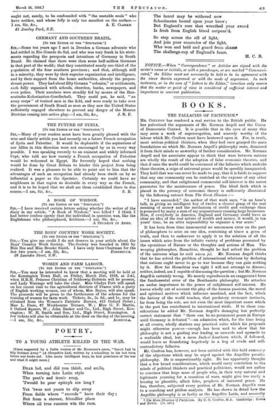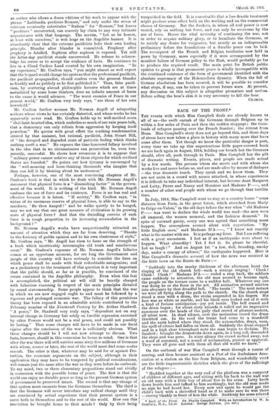BOOKS.
THE FALLACIES OF PACIFICISM.* Mn. COULTON has rendered a real service to the British publio. He has pulverized the arguments of Mr. Norman Angell and the Union of Democratic Control It is possible that in the eyes of many this may seem a work of supererogation, and scarcely worthy of the labour which Mr. Coulton must have bestowed upon it. For, in truth, most serious political thinkers, when they had once grasped the main foundations on which Mr. Norman Angell's philosophy rests, dismissed it from their minds as unworthy of further consideration. Mr. Norman Angell and his associates appear to think that wars between nations are wholly the result of the adoption of false economic theories, and that if once the world could be convinced of the fallacies which underlie those theories, a reign of universal peace would be speedily inaugurated. They hold that war can never be made to pay, that it is futile to suppose that any one community can be enriched at the expense of any other community, and that enlightened commercial self-interest is the surest guarantee for the maintenanoe of peace. The blind faith which is placed in the potency of economic theory is sufficiently illustrated by the following extract from The Great Illusion :-
" I have succeeded," the author of that work says, " in an hour's talk, in giving an intelligent boy of twelve a clearer grasp of the real meaning of money and the mechanism of credit and exchange than is possessed by many a man of my acquaintance running large businesses.
i Now, if everybody in America, England and Germany could have as clear an idea of the real nature of wealth and money, it would, in ton years' time, be an utter impossibility to organize a war scare."
It has been from time immemorial no uncommon error on the part of philosophers to seize on one idea, containing at times a germ of truth, and then to endeavour to apply it to the solution of all the issues which arise from the infinite variety of problems presented by the operations of Nature or the thoughts and actions of Man. The weeping philosopher, Heraclitus, thought he had solved the problem of the universe when he said rdvra Ad. Mr. Norman Angell thinks that he has solved the problem of international relations by declaring that nations ought never to go to war because they can gain nothing by it. How far Heraclitus was right I will not attempt to discuss; neither, indeed, am I capable of discussing the question ; but Mr. Norman Angell is certainly wrong. He merely reproduces in an exaggerate I form the fundamental error of the Benthamito philosophy. Ho attaches an undue importance to the power of enlightened self-interest. He leaves wholly out of account the play of the human passions, the moral and spiritual motives which influence mankind, and the fact, which the history of the world teaches, that predatory economic instincts, far from being the sole, are not even the most important cause which in the past has contributed to international strife. If to these con- siderations be added Mr. Norman Angell's damaging but perfectly correct statement that " there can be no permanent peace in Europe until Germany is defeated "—an admission which, for the time being at all events, wholly shatters any practical value which his proposals might otherwise possess—enough has been said to show that his philosophy is not a guiding star leading us onwards and upwards to a realizable ideal, but a mere Jack-o'-Lanthom which, if followed, would leave us floundering hopelessly in a bog of crude and self- contradictory fallacies.
Mr. Coulton has, however, not been satisfied with this bald summary of the objections which may be urged against the Angollite pseudo- philosophy. He is unquestionably right. Ho has apparently thought that a few broad considerations, which would carry conviction to the minds of political thinkers and practical politicians, would not suffice to convince that large mass of people who, in their very natural and legitimate yearning for a cessation of wars, might give too ready a hearing to plausible, albeit false, prophets of universal peace. Ho has, therefore, subjected every portion of Mr. Norman Angel's case to a searching and pitiless analysis. He has shown in detail how the. Angellite philosophy is as faulty as the Angellite Latin, and assuredly
• The Main Illusions of Pacificism. By 0. G. Coulton, M.A. Cambridge : Bowes and Bowes. [5s. net
an-author who allows a dozen editions of his work to appear with the phrase " Latifundia perditere Romam," and only under the stress of criticism eventually substitutes " Italian " for " Romam," but leaves " perditere " uncorrected, can scarcely lay claim to any very intimate acquaintance with that language. The maxim, "Let us be honest, at least with ourselves," is writ large on the Angellite banner. It is abundantly clear that the extreme pacificists belie their own leading principle. Blunder after blunder is committed. Prophecy after prophecy is falsified. Sophism after sophism is exposed. Yet still the latter-day pacificist stands uncorrected. He refuses to acknow- ledge his errors or to accept the evidence of facts. Ho continues to live in a Cloud Cuckoo Land created by his own imagination. " In my experience," Mr. Coulton says, " you might almost as well expect that the leopard would change his spots as that the professional pacificist, the pacificist propagandist, should confess even the grossest blunder as frankly and as publicly as he first published it." Thus, false pacifi- c:ism, by scattering abroad philosophic heresies which are at times assimilated by some loose thinkers, does an infinite amount of harm to the cause it would advance. " The worst enemies of Peace in our present world," Mr. Coulton very truly says, " are those of her own household."
Mr. Coulton further -accuses Mr. Norman Angell of misquoting authors whose views he has certainly distorted, and whose works he has apparently never road. Mr. Coulton holds up to well-merited scorn " that faint-hearted idea, which underlies so much of our vain peace-talk, that a democracy can only refrain from aggression by keeping itself powerless." He quotes with great effect the scathing condemnation uttered by that eminent, but rational, pacificist, John Stuart Mill, of " the decayed and degraded state of patriotic feeling which thinks nothing worth a war." He exposes the time-honoured fallacy involved is the idea that in no circumstances can persecution be, even tem- porarily, successful. He shows how erroneous it is to suppose that " military power cannot achieve any of those objects for which civilized States are founded." He points out how tyranny is encouraged by the " well-meaning and loose-thinking thousands whe imagine that they can kill it by bleating about its uselessness."
Perhaps, however, one of the most convincing chapters of Mr. Coulton's book is that in which he deals with Mr. Norman Angell's statement that physical force is a " diminishing factor " in the govern- ment of the world. It is nothing of the kind. Mr. Norman Angell confuses the use of force and its existence. Force is no less real and effective because it is latent. " If society," Mr. Coulton says, " in virtue of its enormous reserve of physical force, is able to say to the murderer. Be thou hanged ! ' and he walks quietly to be hanged, may we not say that one groat measure of civilization is its growing
store of physical force And that the dwindling exercise of such force is in rough proportion to its increasing accumulation in tho background ? "
Mr. Norman Angell's works have unquestionably attracted an amount of attention which they are far from deserving. " Thanks to the leniency of public opinion and to his own elusiveness of style," Mr. Coulton says, " Mr. Angell has risen to fame on the strength of a book which inextricably intermingles old truth and mischievous error." Mr. Goulton's exposure of Mr. Norman Angell's fallacies comes at an opportune moment, for ore long the Government and people of this country will have seriously to consider the lines on which peace shall bo made with their redoubtable antagonists; and as a preliminary to the treatment of this question it is very important that the public should, so far as is possible, be convinced of the errors contained in the Angellite philosophy. Even when this feat is accomplished, the political air will still be heavily charged with fallacious reasoning in respect of the main principles dictated by sound statesmanship. Some people appear to think that the war in which we are now engaged ought to and must be followed by a vigorous and prolonged economic war. The fallacy of this pernicious theory has been exposed in an admirable article contributed to the February number of the Nineteenth Century by Dr. Arthur ShadwelL " A peace," Dr. Shadwell very truly says, " dependent not on any internal change in Germany but solely on forcible repression exercised by other Powers would not be a real peace, and could not possibly be lasting." That some changes will have to be made in our fiscal regime after the conclusion of the war is sufficiently obvious. What those changes should be I will not now attempt to discuss. Two facts, however, should in this connexion be borne in mind. One is that after the war there will still survive some sixty-five millions of Germans with whom, sooner or later, the rest of the world must find some modus vivendi. The other is that whatever may be said for or against Pro- tection, the economic arguments on the subject, although in their application they may have to be tempered by political considerations, will remain just the same after the war as they were before its outbreak. To my mind, two or three elementary propositions stand out vividly
in connexion with the possible terms of peace. The first is that the world can enjoy no durable peace so long as the present German system of government be preserved intact. The second is that any change of that system must emanate from the Germans themselves. The third is that the Germans will never introduce any radical change until they
are convinced by actual experience that their present system is a curse both to themselves and to the rest of the world. How can this conviction be brought home to their minds ? Only by their being
vanquished in the field. It is conceivable that a loss drastic treatment might produce some effect both on the working and on the commercial classes of Germany. But the Junkers, in whom all real power is now vested, rely on nothing but force, and can only be overcome by the use of force. Hence the vital necessity of continuing the war, not in order to acquire military glory, or to humiliate the Germans, or to satisfy any desire for vengeance, but merely as an indispensable preliminary before the foundations of a durable peace can be laid. The reconquest of the French and Belgian territories now held in pawn by Germany, more especially if it were accompanied by the manifest failure of German policy in the East, would probably go far to produce the required result. The main point for British pablie opinion to grasp is that permanent peace is wholly incompatible with the continued existence of the form of government identified with the absolute supremacy of the Hohenzollern dynasty. When the fall of German absolutism has been secured, it will be possible to consider what steps, if any, can be taken to prevent future wars. At present, any discussion on this subject is altogether premature and useless. before selling the bear's skin it is very necessary to kill the bear.
Caosiss.



























 Previous page
Previous page